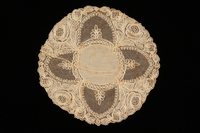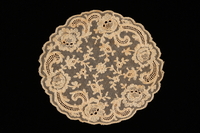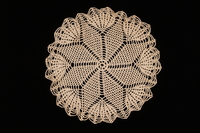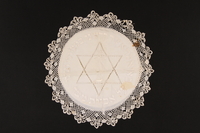Overview
- Description
- Documents, correspondence and photographs illustrating the experiences of Manfred and Rita Grunbaum, and their daughter Dorien [donor], before, during, and after the Holocaust in the Netherlands and Germany; includes letters sent between Manfred in the Netherlands and family in Mexico, pre-war photographs, and post-war writings. Dorien Grunbaum was born in 1942 in the Netherlands and was deported with her parents to the Westerbork internment camp and then to the Bergen-Belsen concentration camp in Germany. From there they were sent by train from which they were liberated in April 1945.
- Credit Line
- United States Holocaust Memorial Museum Collection, Gift of Dorien Grunbaum
Physical Details
- Genre/Form
- Letters. Photographs.
- Extent
-
2 folders
Rights & Restrictions
- Conditions on Access
- There are no known restrictions on access to this material.
- Conditions on Use
- The donor, source institution, or a third party has asserted copyright over some or all of these material(s). The Museum does not own the copyright for the material and does not have authority to authorize use. For permission, please contact the rights holder(s).
- Copyright Holder
- Ms. Dorien Grunbaum
Keywords & Subjects
- Geographic Name
- Netherlands.
Administrative Notes
- Holder of Originals
-
United States Holocaust Memorial Museum
- Legal Status
- Permanent Collection
- Provenance
- Donated to the United States Holocaust Memorial Museum in 2008 by Dorien Grunbaum.
- Record last modified:
- 2022-07-28 17:50:07
- This page:
- https://collections.ushmm.org/search/catalog/irn36255
Download & Licensing
- In Copyright
- Terms of Use
- This record is digitized but cannot be downloaded online.
In-Person Research
- Requires Research Visit
- Plan a Research Visit
-
Request in Shapell Center Reading Room
Bowie, MD
Contact Us
Also in Dorien Grunbaum family collection
The collection consists of artifacts, correspondence, documents, and photographs related to the experiences of Manfred and Rita Grunbaum and their daughter, Dorien, in the Netherlands, Westerbork transit camp, and Bergen-Belsen concentration camp before and during the Holocaust, and in Germany, the Netherlands, and the United States in the postwar period.
Date: 1938-1945

Lace doily with net semi-circles and floral design recovered by Dutch Jewish family
Object
Lace doily with large net semi-circles and embroidered flowers recovered by Rita Grunbaum in the Netherlands after the war. She was living in Rotterdam with her husband, Manfred, when Nazi Germany invaded the country on May 10, 1940. Jews became targets of official persecution. Manfred was arrested but quickly released in October 1941. Rita and Manfred decided to have a child to show faith in the future and their daughter, Dorien, was born on August 28, 1942. A year later, two SS men and a Dutch policemen came and arrested them on September 29, 1943. While in the local police station, they considered giving their baby to a non-Jewish woman about to be released, but decided that the family should stay together. They were sent to Westerbork transit camp, and then to Bergen-Belsen concentration camp. On April 9, 1945, the Germans began to evacuate the camp because of advancing Allied forces and the inmates were loaded onto trains. Their guards abandoned them near Troebitz, Germany, and with the arrival of Soviet Forces on April 23, they realized that they were free. The family returned to Holland on July 1, 1945.

White net doily with embroidered flowers recovered by a Dutch Jewish family
Object
Embroidered floral net doily recovered by Rita Grunbaum in the Netherlands after the war. She was living in Rotterdam with her husband, Manfred, when Nazi Germany invaded the country on May 10, 1940. Jews became targets of official persecution. Manfred was arrested but quickly released in October 1941. Rita and Manfred decided to have a child to show faith in the future and their daughter, Dorien, was born on August 28, 1942. A year later, two SS men and a Dutch policemen came and arrested them on September 29, 1943. While in the local police station, they considered giving their baby to a non-Jewish woman about to be released, but decided that the family should stay together. They were sent to Westerbork transit camp, and then to Bergen-Belsen concentration camp. On April 9, 1945, the Germans began to evacuate the camp because of advancing Allied forces and the inmates were loaded onto trains. Their guards abandoned them near Troebitz, Germany, and with the arrival of Soviet Forces on April 23, they realized that they were free. The family returned to Holland on July 1, 1945.

Flower patterned crocheted doily made by a Dutch Jewish woman after the war
Object
Embroidered floral weblike doily made by Rita Grunbaum after the war. She was living in Rotterdam with her husband, Manfred, when Nazi Germany invaded the country on May 10, 1940. Jews became targets of official persecution. Manfred was arrested but quickly released in October 1941. Rita and Manfred decided to have a child to show faith in the future and their daughter, Dorien, was born on August 28, 1942. A year later, two SS men and a Dutch policemen came and arrested them on September 29, 1943. While in the local police station, they considered giving their baby to a non-Jewish woman about to be released, but decided that the family should stay together. They were sent to Westerbork transit camp, and then to Bergen-Belsen concentration camp. On April 9, 1945, the Germans began to evacuate the camp because of advancing Allied forces and the inmates were loaded onto trains. Their guards abandoned them near Troebitz, Germany, and with the arrival of Soviet Forces on April 23, they realized that they were free. The family returned to Holland on July 1, 1945.

Matzoh cover with an embroidered Star of David, kiddush cup, and Hebrew inscription recovered postwar by a Dutch Jewish family
Object
Embroidered white matzoh cover with a Star of David, goblet, and Hebrew inscription recovered after the war by Rita Grunbaum. The inscription includes the date 1919 and the blessing over the matzoh that is recited at the seder. Rita was living in Rotterdam with her husband, Manfred, when Nazi Germany invaded the country on May 10, 1940. Jews became targets of official persecution. Manfred was arrested but quickly released in October 1941. Rita and Manfred decided to have a child to show faith in the future and their daughter, Dorien, was born on August 28, 1942. A year later, two SS men and a Dutch policemen came and arrested them on September 29, 1943. While in the local police station, they considered giving their baby to a non-Jewish woman about to be released, but decided that the family should stay together. They were sent to Westerbork transit camp, and then to Bergen-Belsen concentration camp. On April 9, 1945, the Germans began to evacuate the camp because of advancing Allied forces and the inmates were loaded onto trains. Their guards abandoned them near Troebitz, Germany, and with the arrival of Soviet Forces on April 23, they realized that they were free. The family returned to Holland on July 1, 1945.



